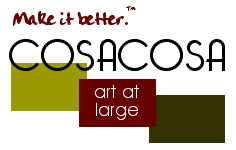



13 Questions for which we have no answers:
1. What is our new place, our role as performance artists in the new century?
2. What are future formats for performance art?
3. What do words like 'radical,' 'transgressive,' 'rebellious,' and 'oppositional' mean after 9/11?
4. Where are the new borders we must cross?
5. What are the new reasons for sitting at the table together, so to speak, in a time where all progressive political projects seem to be bankrupt?
6. What binds our otherwise extremely diverse ethnic identities, aesthetics and community concerns? The search for 'radical' tolerance and for a new way of presenting and distributing important ideas?...Or the need to find a new spirituality emerging out of the debris of our recently fallen world?
7. Where should we place most of our energies; in the local or the international? In the artistic or the pedagogic project?
8. Is it possible to make politically pertinent art in the face of globalization gone wrong, government censorship, panic culture, mindless interactivity, Reality TV, and the general passivity of the citizenry? Are we able to recuperate the possibility of change in a society like ours, in which all changes implode or are instantly commodified?
9. If we are interested in performing for non-specialized audiences, what certainty do we have that these audiences won't misinterpret our "radical" actions and out complex performative identities as merely spectacles of radicalism or stylized hybridity?
10. If our new audiences are more interested in direct stimulation that in content, can we effectively camouflage content as experience?
11. As performance artists, how to re-humanize, re-politicize and decolonize our own bodies wounded by the media and intervened by the invisible surgery or pop culture?
12. How can we continue to deal with extremely sensitive issues without sounding self-righteous or scaring away our audiences?
13. Can we get our audiences to co-create work with us?
I have no answers. We have no answers. We politely ask the visitor these questions.
1. What is our new place, our role as performance artists in the new century?
2. What are future formats for performance art?
3. What do words like 'radical,' 'transgressive,' 'rebellious,' and 'oppositional' mean after 9/11?
4. Where are the new borders we must cross?
5. What are the new reasons for sitting at the table together, so to speak, in a time where all progressive political projects seem to be bankrupt?
6. What binds our otherwise extremely diverse ethnic identities, aesthetics and community concerns? The search for 'radical' tolerance and for a new way of presenting and distributing important ideas?...Or the need to find a new spirituality emerging out of the debris of our recently fallen world?
7. Where should we place most of our energies; in the local or the international? In the artistic or the pedagogic project?
8. Is it possible to make politically pertinent art in the face of globalization gone wrong, government censorship, panic culture, mindless interactivity, Reality TV, and the general passivity of the citizenry? Are we able to recuperate the possibility of change in a society like ours, in which all changes implode or are instantly commodified?
9. If we are interested in performing for non-specialized audiences, what certainty do we have that these audiences won't misinterpret our "radical" actions and out complex performative identities as merely spectacles of radicalism or stylized hybridity?
10. If our new audiences are more interested in direct stimulation that in content, can we effectively camouflage content as experience?
11. As performance artists, how to re-humanize, re-politicize and decolonize our own bodies wounded by the media and intervened by the invisible surgery or pop culture?
12. How can we continue to deal with extremely sensitive issues without sounding self-righteous or scaring away our audiences?
13. Can we get our audiences to co-create work with us?
I have no answers. We have no answers. We politely ask the visitor these questions.
La Pocha Nostra is "an ever morphing trans-disciplinary arts organization" founded by artist and writer Guillermo Gomez-Pena. Learn more about their work at www.pochanostra.com
Artolatry bread image after Salvadore Dalí's Basket of Bread (1926).